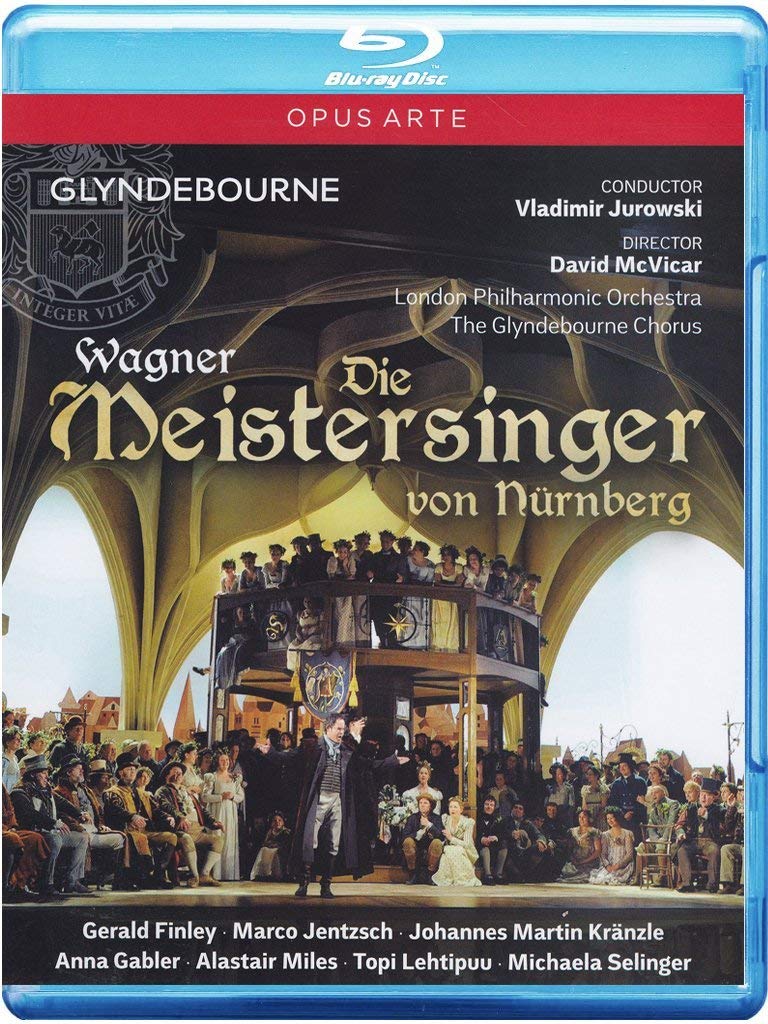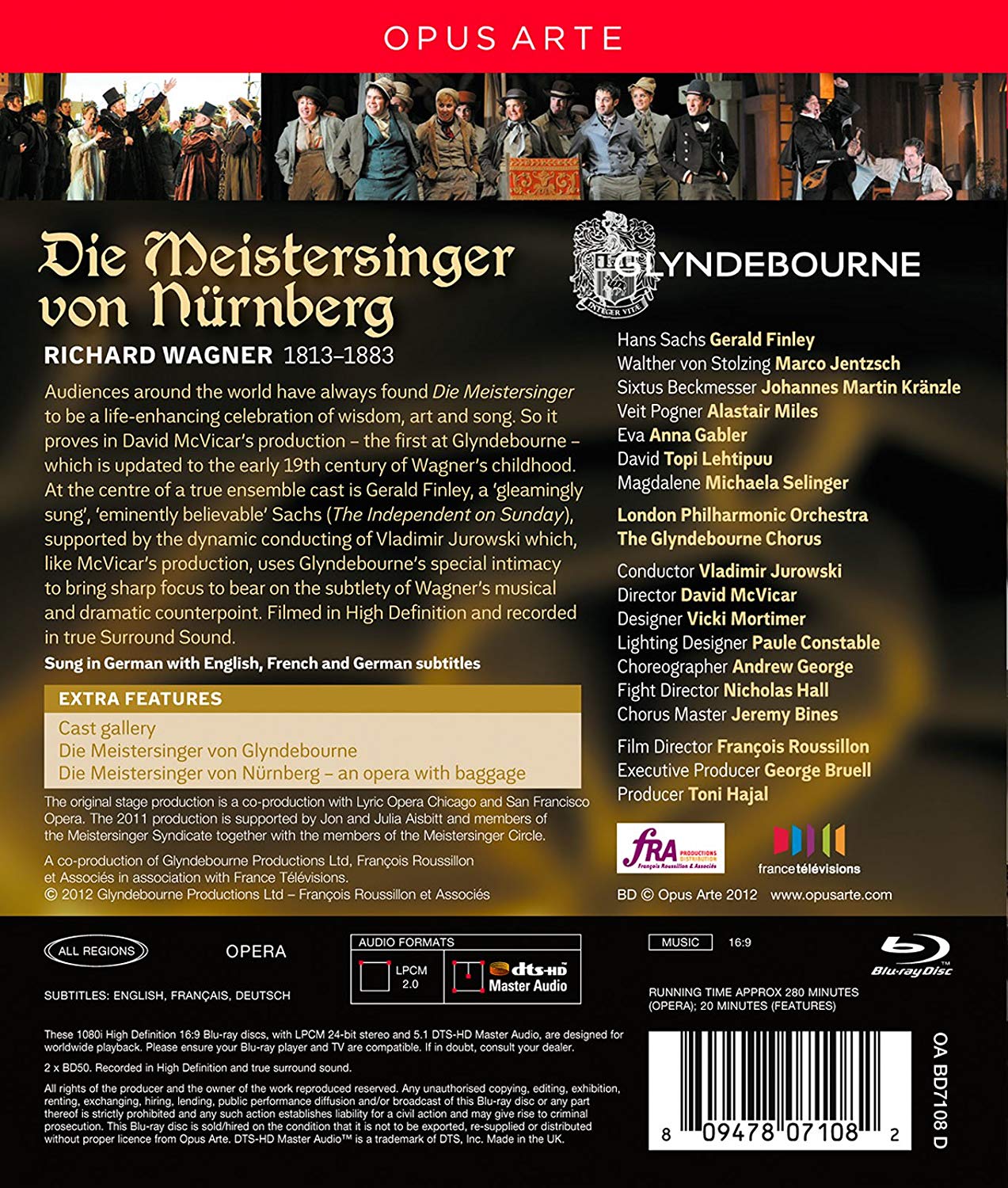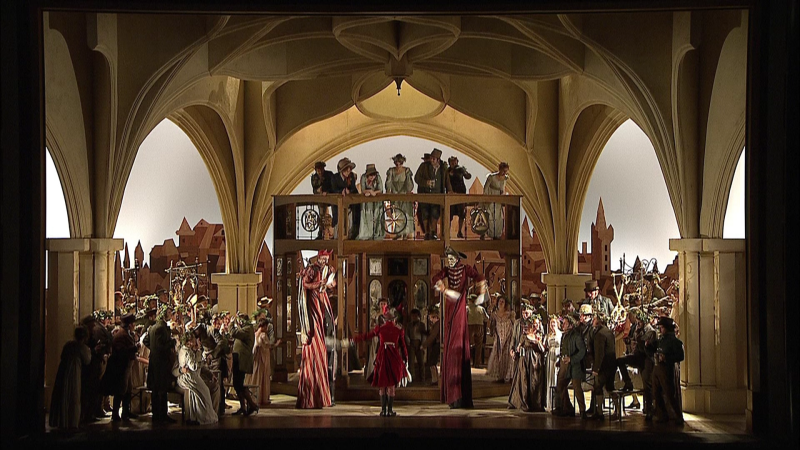

Wagner Die Meistersinger von Nürnberg opera to a libretto by the composer. Directed 2011 by David McVicar at Glyndebourne. Stars Gerald Finley (Hans Sachs), Marco Jentzsch (Walter von Stolzing), Johannes Martin Kränzle (Sixtus Beckmesser}, Alastair Miles (Veit Pogner), Anna Gabler (Eva), Topi Lehtipuu (David), Michaela Selinger (Magdelena), Colin Judson (Kunz Vogelgesang), Andrew Slater (Konrad Nachtigall), Henry Waddington (Fritz Kothner), Robert Poulton (Herrman Ortel), Alasdair Elliot (Balthasar Zorn), Daniel Norman (Augustin Moser), Adrian Thompson (Ulrich Eisslinger), Graeme Broadbent (Hans Foltz), Maxim Mikhailov (Hans Schwarz), Mats Almgren (Nightwatchman). Vladimir Jurowski conducts the London Philharmonic Orchestra (Leader Pieter Schoeman; Assistant Conductor Anthony Negus) and the Glyndebourne Chorus (Chorus Master Jeremy Bines). Design by Vicki Mortimer; lighting design by Paule Constable; choreography by Andrew George; fight direction by Nicholas Hall. Directed for TV by François Roussillon; sound supervision by Andy Rose; executive production by George Bruell; produced by Toni Hajal. Sung in German. Released 2012, discs have 5.1 dts-HD Master Audio sound. Grade: A
The May 2013 issue of Gramophone had a long article considering all the major recordings in history of Die Meistersinger. Arnold Whittall picked the DVD version of subject title as the best conventional-version video available of Meistersinger (page 120). If this recording as DVD was great, it would be even greater in Blu-ray.
So lets jump right into some screenshots. Meet Hans Sachs (brilliantly played by Gerald Finley), the most famous of the Nürnberg master singers. (The name of the opera in German is in the plural, so it refers to the guild of singers, not to Hans.) Finley is on stage and before the camera a lot in this show, and this is my favorite image of him. Hans is a cobbler of shoes by trade, but famous in his city as a poet and singer. In a scene of heart-seizing poignancy (sorry, too dark for a screenshot), David McVicker tell us that Sachs has suffered the early deaths of his wife and two children. He's admired, but he's lonely; and he is in love with the much younger Eva Pogner:
Now we meet Eva Pogner (Anna Gabler). Her father, Veit Pogner, is a wealthy merchant and also a Meistersinger and a friend of Hans Sachs. Eva has just met an impoverished knight (nobleman) named Walther von Stolzing (Marco Jentzsch). Walter has abandoned his unproductive estate and now seeks to make his way in the bourgeois world of commerce and trade:
Eva is swept away by her handsome new friend. Here she confides with her companion Magdalene (Michaela Selinger):
The Meistersinger Guild meets at the cathedral. Here you see the beautiful arched set that is used throughout the opera. All the designs in this show (sets, costumes, wigs, props, and lighting) are gorgeous and nearly equal in quality to fine historical motion pictures. Roussillon gives us a variety of shots. But since this is basically a 4-hour story about three men in love with Eva, Roussillon tends to moves his cameras up close for intimate views:
Now we meet Eva's father, Veit (Alastair Miles). He has just announced that the winner of a singing contest to be held in a few days will be awarded the hand of Eva in marriage. After lively discussion, all agree that Eva will not be forced to marry anyone against her will. But only contest winners can woo her:who
Now we meet Sixtus Beckmesser (Johannes Martin Kränzle). He is a professional bachelor and a somewhat effete office-type who is the Nürnberg town clerk. He's been in love with Eva forever, and Eva does all she can never to encourage him. Here Sixtus argues successfully that he should be allowed to compete in the wooing of Eva:
Walter is broke, but he's a pretty good poet and singer. He asks to be admitted to the Mastersinger Guild, and gets an audition. But the guild members are conservative, even stogy; and they have a book of rules determining what songs will be acceptable to them. Walter is, of course, burning with romantic notions and dreams that inspire his free-form songs:
The guild members are horrified by Walter's rule-breaking song. They laugh him off the stage, but Hans comes to his defence;
Meanwhile Eva, who has loved Hans for a long time, is confused by her infatuation with Walter. She approaches Hans, and offers herself to him:
Hans gently rebuffs Eva so she may pursue her friendship with the knight. Walter is furious at the guild members for treating him so rudely at the audition. He and Eva talk of eloping:
But Hans gets wind of this and urges Walter not to do anything rash. A better course would be for Walter to woo Eva at the singing contest. Hans can teach Walter what he needs to know. So here we see Hans and Walter working on a new love song that will follow all the rules:
Sixtus fears this will be his last chance to woo Eva. He accuses Hans of secretly planning to enter the contest:
Now Eva is deeply in love with two men at the same time. In Walter's presence she pours out her heart again to Hans. But he is resolute—he's too old for her:
Now Walter has to put up or shut up. He continues to work on his new song for the contest:
It's festival day. We will see if, before all the people, anyone can successfully woo Eva:
Below is my favorite François Roussillon/Paule Constible image from the whole opera. Note the wonderful detail in the costumes, the sharp resolution, the masterful framing of the subject, and the luminous glow of the picture. I can't believe I have such beautiful images as this all but filling my field of vision in my HT:
Sixtus makes a fool of himself for the last time:
Walter wins Eva.
To me, the most impressive thing about this opera is that Wagner wrote such a good libretto as well as the music. This review gives you a fair idea about Eva and her suitors; but I've said nothing about a host of other characters and ideas that Wagner weaves into the love story.
Mozart and Beethoven did not write for posterity, but Wagner did. The next six screenshots all come from a short segment at the end of the opera where Wagner waxes philosophical-political and speaks of the role of German art in German society:
Now we run smack-dab into the Wagner conundrum—what to make of his anti-Semitism. For most of my life, I allowed no Wagner in my house. But now that I'm writing a blog about HD TV display of opera, I can't avoid Richard.
What kind of "false, foreign rule" was Wagner concerned about at the end of Die Meistersinger? Well, 6 years after Wagner died, a false, foreign ruler was born in Austria. That ruler had a defective personality and a poor education, but he was a highly skilled and creative artist and designer. He could have made a living painting (especially in water color) architectural subjects and landscape. He was well-versed in German music and opera. He became one of the most effective orators in all history and wrote a best-selling book. He was not interested in making money. Instead he undertook to use his artistic skill to change the world for the better. He mastered the use of radio and motion pictures to further his ambitions, and eventually became the world's first multi-media superstar. Whoever was "German and true" fled to the United States or other places. He seduced the rest of the Germans into entering a suicidal war that led to the early deaths of scores of millions. One of his favorite operas was Die Meistersinger von Nürnberg, and he made Nürnberg the headquarters city for his political party. He socialized with Wagner's heirs, who admired him and found his ideas of German superiority and anti-Semitism consistent with Wagner's own thinking.
Was Wagner at the end of Die Meistersinger trying to warn that an Adolf Hitler might happen? I don't think so. Was Wagner thinking about Jews with his remarks about "false, foreign" rule? And if you decide that the end of the opera is anti-Semitic, could you solve the problem by just ending the opera 5 minutes earlier? Well, the Wagner problem runs through all his work and can't be dealt with further in this mini-review. But there can be no doubt that Wagner was part of the mindset that led in the generation following Wagner to the greatest catastrophe in history to befall Germany and most of the rest of Europe.
The OperaDou Jury saw this on two consecutive evenings. The length of the work left some squirming in their seats, and others thought the singers were too often overpowered by the orchestra. (I watch this with the English or German subtitles on and have no trouble understanding the singers.) The Jury gave it the grade of A-.
The screenshots show the magnificent work done by Glyndebourne and Roussillon in the design, directing, and recording of this production. The acting of all the singers and the sound recording are also superb. All this plus the strong recommendation from Gramophone supports an A. I'll shy away from A+ because of the length of the work and the Wagner conundrum. But for Wagner fans, this is an A+ title.
Here’s an official clip:
OR

























